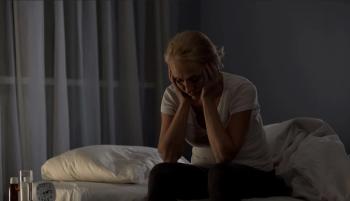
Insomnia
Maladaptive behavior can produce poor sleep and worsen insomnia complaints.
A 36-year-old man reported difficulty falling asleep for the past 6 weeks weeks following the loss of his job. He has been so tired by mid-afternoon that he lies down on the couch for an hour or so to “catch up.” You rule out other causes of insomnia, such as medical and major psychiatric syndromes and decide to initially manage the sleep problem with nonpharmacologic methods.
Answer: A-Avoid napping during the day Discussion
In general, prolonged napping in persons with insomnia results in a decreased drive for sleep and may exaggerate insomnia problems during the subsequent night. Patients, therefore, should be advised to avoid napping as much as possible. Exercise, although offering clear health benefits, is optimal to enhance sleep when performed not too close to bedtime; in some individuals, exercise performed within a few hours of bedtime may disturb sleep further. Prolonging time in bed during the day is a strategy commonly used by insomniacs, to make up for lost sleep. However, it can cause even greater difficulty in falling asleep on the subsequent night since it may reset circadian rhythms to a later time. In general, insomniacs should be advised to get out of bed at a consistently early time on a daily basis. Alcohol, although it may enhance sleep onset, can also lead to poor quality and interrupted sleep afterwards; it can also increase sleep-related breathing abnormalities. Staying in bed while sleepless for prolonged periods may actually increase preoccupation with sleeplessness and enhance anxiety while in bed. Therefore, it may be helpful for insomniacs to get out of bed if they lie awake in bed for 30 minutes or longer, and to engage in non-stimulating activities such as reading, preferably in a different room that is dimly lit.
Take home points:
1. Maladaptive behavior can produce poor sleep and worsen insomnia complaints.
2. Sleep hygiene recommendations can be very helpful in addressing occasional difficulties with insomnia and may minimize the need for hypnotic medications
Suggested reading:
• Morgenthaler T, Kramer M, Alessi C, et al.Practice parameters for the psychological and behavioral treatment of insomnia: an update. An American Academy of Sleep Medicine report.
• Hauri, PJ. Sleep/wake lifestyle modifications: Sleep hygiene. In: Barkoukis TJ, Matheson JK, Ferber R, Doghramji K. Therapy in Sleep Medicine. Elsevier Saunders, Philadelphia, 2012, pp. 151-160.
Newsletter
Enhance your clinical practice with the Patient Care newsletter, offering the latest evidence-based guidelines, diagnostic insights, and treatment strategies for primary care physicians.































































































































